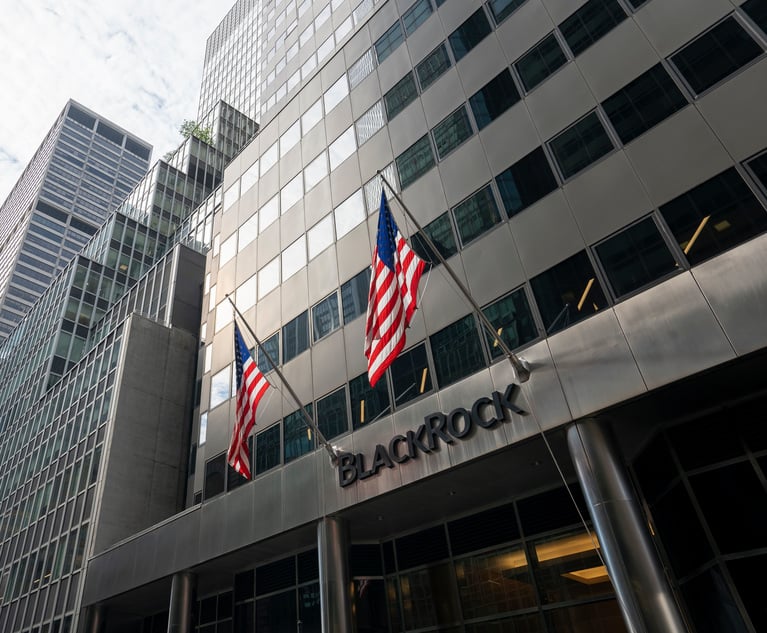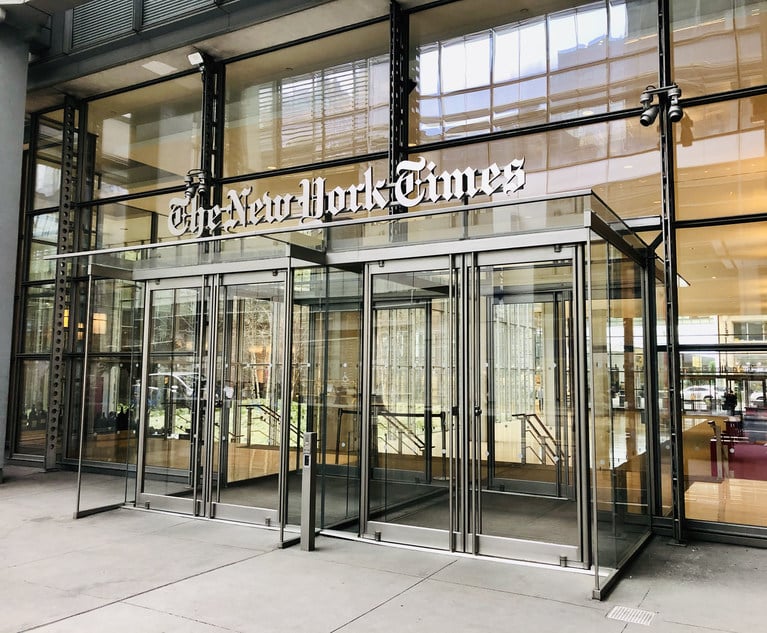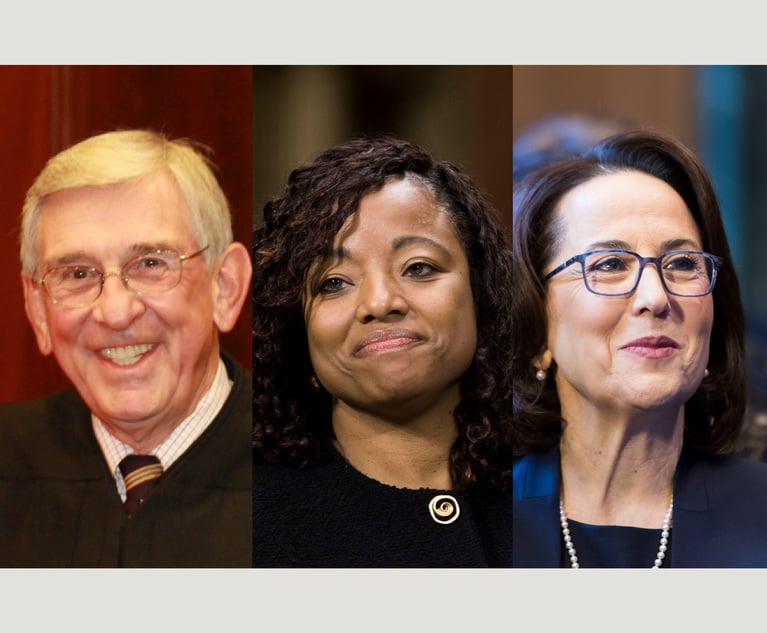 U.S. Supreme Court building on April 23, 2019.
U.S. Supreme Court building on April 23, 2019.Mandatory Bar Dues Are Defended as Challenges Pile Up at Supreme Court
"A bar association is not the exclusive representative of its membership in any context. A lawyer is always free to publicly take a position contrary to that of the state bar of which the lawyer is a member," Goldstein & Russell partner Sarah Harrington tells the justices.
February 03, 2020 at 06:25 PM
5 minute read
Challenges to mandatory bar memberships and dues soon will be teed up in the U.S. Supreme Court in two cases asking the justices to extend the reach of their landmark 2018 First Amendment ruling that invalidated "fair share" union fees to include the legal arena.
Current and former officers of the State Bar Association of North Dakota have retained Goldstein & Russell partner Sarah Harrington, a former assistant to the solicitor general who has argued 21 Supreme Court cases. Harrington, in a new filing Monday at the high court, defended the state's "integrated bar" and urged the justices to keep a lower court ruling in place in the case Fleck v. Wetch.
"A bar association is not the exclusive representative of its membership in any context. A lawyer is always free to publicly take a position contrary to that of the state bar of which the lawyer is a member," Harrington told the justices. "Thus, compulsory membership places less of a burden on the lawyer's First Amendment rights."
Meanwhile, Foley & Lardner partner Roberta Howell is representing the Wisconsin bar in the bar-fees case Jarchow v. State Bar of Wisconsin. Her brief, which will ask the court to uphold the state's fee structure, is due next month.
Central to both disputes is the Supreme Court's 2018 decision in Janus v. AFSCME, a labor and employment case that overturned a decades-old ruling that said public-sector unions could require the payment of certain fees from nonmembers. The divided ruling was expected to fuel challenges to mandatory bar fees for attorneys.
The North Dakota case Fleck is on its second trip at the Supreme Court. North Dakota attorney Arnold Fletch is challenging compulsory membership as a violation of his First Amendment right of association and the dues structure as violating his right to "affirmatively consent" before contributing funds for non-chargeable activities.
The U.S. Court of Appeals for the Eighth Circuit first rejected his challenge in 2017. But the Supreme Court, following its union decision in 2018, sent the case back to the appellate court ruling for consideration in light if its decision in Janus. A panel of the Eighth Circuit in August unanimously reaffirmed its earlier decision. Fletch is represented in the high court by Timothy Sandefur of the Goldwater Institute in Phoenix.
 Baker & Hostetler's offices in Washington, D.C. Photo: Diego M. Radzinschi/ALM
Baker & Hostetler's offices in Washington, D.C. Photo: Diego M. Radzinschi/ALM
In the Wisconsin case, lawyers Adam Jarchow and Michael Dean are represented in the Supreme Court by Baker & Hostetler partner David Rivkin. A Seventh Circuit panel in December, affirming a trial court decision, disposed of their appeal in an order stating: "The district court, in its thorough and well-reasoned order, correctly held that the appellants' claims are foreclosed by Keller v. State Bar of California (1990)."
That same month, the two Wisconsin lawyers asked the Supreme Court to overrule its two precedents upholding integrated bars: Lathrop v. Donohue (1961) and Keller. Those two cases, they contend, are irreconcilable with the Janus union ruling. Integrated bars require lawyers who are licensed to practice law to maintain bar membership and pay annual dues.
"The deferential standard applied by Lathrop and Keller is unsupportable, but its persistence deprives the hundreds of thousands of attorneys who are compelled by state law to join and subsidize the speech of integrated bars of their First Amendment rights," Rivkin told the justices.
In the North Dakota case, Harrington's effort to keep the lower court ruling in place has support from the North Dakota Attorney General's Office.
North Dakota lawyers have an option to pay for only his or her annual license fee to practice law, James Nicolai of the attorney general's office told the high court.
"Each attorney, if he or she chooses, may also voluntarily support the state bar's political speech by writing a check or making payment for the slightly greater amount that includes non-germane expenses; an amount expressly disclosed on the annual statement and accompanying instructions," Nicolai wrote.
Nicolai and Harrington contend that Fleck waived many of his key arguments when he conceded that Keller and Lathrop control. He also ignored a line of decisions culminating in Janus that Keller remains good law, the lawyers argued.
Fleck has drawn amicus support from groups including the National Right to Work Legal Defense Foundation, the Pacific Legal Foundation and the Liberty Justice Center.
This content has been archived. It is available through our partners, LexisNexis® and Bloomberg Law.
To view this content, please continue to their sites.
Not a Lexis Subscriber?
Subscribe Now
Not a Bloomberg Law Subscriber?
Subscribe Now
NOT FOR REPRINT
© 2025 ALM Global, LLC, All Rights Reserved. Request academic re-use from www.copyright.com. All other uses, submit a request to [email protected]. For more information visit Asset & Logo Licensing.
You Might Like
View All
US Courts Announce Closures in Observance of Jimmy Carter National Mourning Day
2 minute read
Who Got the Work: Gibson Dunn and Wilmer to Defend BlackRock in ESG Antitrust Lawsuit
2 minute read
New York Times Moves for $100K in Attorney Fees Against Dfinity Foundation
3 minute read
Split 4th Circuit Revives Constitutional Challenge to Child Vaccine Mandate
Trending Stories
- 1Restoring Trust in the Courts Starts in New York
- 2'Pull Back the Curtain': Ex-NFL Players Seek Discovery in Lawsuit Over League's Disability Plan
- 3Tensions Run High at Final Hearing Before Manhattan Congestion Pricing Takes Effect
- 4Improper Removal to Fed. Court Leads to $100K Bill for Blue Cross Blue Shield
- 5Michael Halpern, Beloved Key West Attorney, Dies at 72
Who Got The Work
Michael G. Bongiorno, Andrew Scott Dulberg and Elizabeth E. Driscoll from Wilmer Cutler Pickering Hale and Dorr have stepped in to represent Symbotic Inc., an A.I.-enabled technology platform that focuses on increasing supply chain efficiency, and other defendants in a pending shareholder derivative lawsuit. The case, filed Oct. 2 in Massachusetts District Court by the Brown Law Firm on behalf of Stephen Austen, accuses certain officers and directors of misleading investors in regard to Symbotic's potential for margin growth by failing to disclose that the company was not equipped to timely deploy its systems or manage expenses through project delays. The case, assigned to U.S. District Judge Nathaniel M. Gorton, is 1:24-cv-12522, Austen v. Cohen et al.
Who Got The Work
Edmund Polubinski and Marie Killmond of Davis Polk & Wardwell have entered appearances for data platform software development company MongoDB and other defendants in a pending shareholder derivative lawsuit. The action, filed Oct. 7 in New York Southern District Court by the Brown Law Firm, accuses the company's directors and/or officers of falsely expressing confidence in the company’s restructuring of its sales incentive plan and downplaying the severity of decreases in its upfront commitments. The case is 1:24-cv-07594, Roy v. Ittycheria et al.
Who Got The Work
Amy O. Bruchs and Kurt F. Ellison of Michael Best & Friedrich have entered appearances for Epic Systems Corp. in a pending employment discrimination lawsuit. The suit was filed Sept. 7 in Wisconsin Western District Court by Levine Eisberner LLC and Siri & Glimstad on behalf of a project manager who claims that he was wrongfully terminated after applying for a religious exemption to the defendant's COVID-19 vaccine mandate. The case, assigned to U.S. Magistrate Judge Anita Marie Boor, is 3:24-cv-00630, Secker, Nathan v. Epic Systems Corporation.
Who Got The Work
David X. Sullivan, Thomas J. Finn and Gregory A. Hall from McCarter & English have entered appearances for Sunrun Installation Services in a pending civil rights lawsuit. The complaint was filed Sept. 4 in Connecticut District Court by attorney Robert M. Berke on behalf of former employee George Edward Steins, who was arrested and charged with employing an unregistered home improvement salesperson. The complaint alleges that had Sunrun informed the Connecticut Department of Consumer Protection that the plaintiff's employment had ended in 2017 and that he no longer held Sunrun's home improvement contractor license, he would not have been hit with charges, which were dismissed in May 2024. The case, assigned to U.S. District Judge Jeffrey A. Meyer, is 3:24-cv-01423, Steins v. Sunrun, Inc. et al.
Who Got The Work
Greenberg Traurig shareholder Joshua L. Raskin has entered an appearance for boohoo.com UK Ltd. in a pending patent infringement lawsuit. The suit, filed Sept. 3 in Texas Eastern District Court by Rozier Hardt McDonough on behalf of Alto Dynamics, asserts five patents related to an online shopping platform. The case, assigned to U.S. District Judge Rodney Gilstrap, is 2:24-cv-00719, Alto Dynamics, LLC v. boohoo.com UK Limited.
Featured Firms
Law Offices of Gary Martin Hays & Associates, P.C.
(470) 294-1674
Law Offices of Mark E. Salomone
(857) 444-6468
Smith & Hassler
(713) 739-1250










